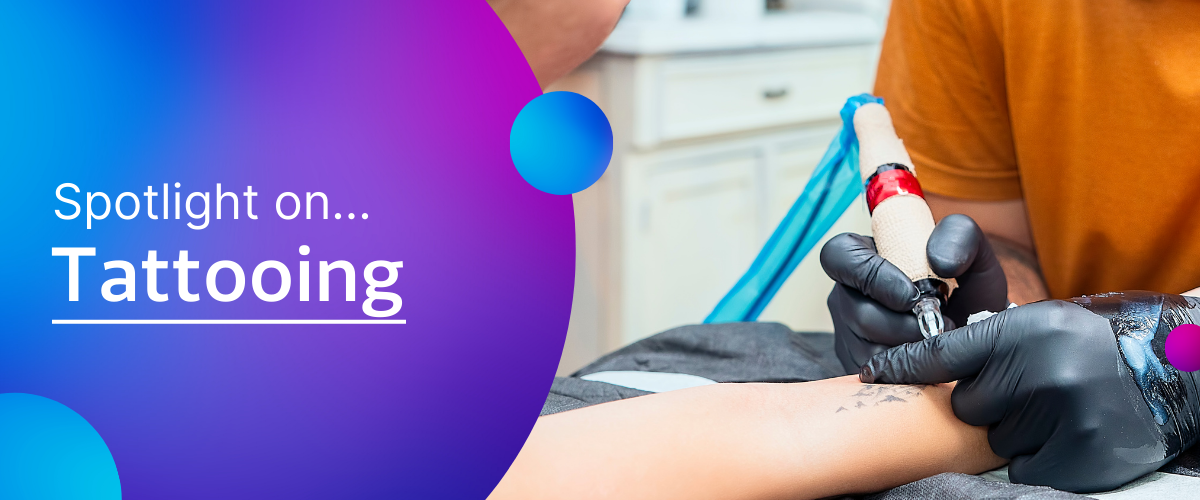Chances are, you know someone who has a tattoo. If you’re aged between 25 and 39, then you may only need to ask two of your friends to find that someone.
Tattooing is an industry that is worth about £1.5 billion worldwide - and that figure is expected to double by the end of the decade.
This means that the demand for qualified tattoo artists is on the rise. However, the pathways to support up-and-coming artists - and therefore produce a consistently high standard of talent - are far less well-developed. Here’s why.
Can you qualify as a Tattoo artist?
In spite of this high demand for artists, there are no nationally-recognised pathways for a budding tattoo artist to follow in order to become ‘qualified’.
Students can obtain a nationally-recognised certification, such as an HNC (Level 5) or an HND (Level 6) in Art & Design with Tattoo Illustration at certain colleges. However, this alone won’t make an apprentice eligible for a career: these courses will only serve as a stepping stone to an apprenticeship in a tattoo studio.
What’s more, an ‘apprenticeship’ in a tattoo studio is unlike an apprenticeship in any other field.
The state of ‘apprenticeships’ in tattooing
Whereas apprentices in construction will follow a curriculum, sit assessments and gain a nationally-recognised qualification from a certified awarding body, apprentice tattoo artists become qualified when the studios that host them decide that they are ready (and have the appropriate licenses for them to practice).
This frequently means that learning journeys, outcomes and support for apprentices are vastly different from one studio to the next.
For example, whereas one apprentice might be able to rely on a learning plan, clear development goals and a basic salary, another may have none of those things.
For tattoo studios, the latter is the norm - and it’s a double-edged sword:
On one hand, studios can train new talent for little cost whilst also relying on them to handle more ‘menial’ tasks in a studio: this frees up trained artists to ‘ink’ and earn money. Once an apprentice is trained, these studios will often ask them to work exclusively at that studio for a time afterwards.
On the other hand, this model is increasingly coming under scrutiny. With no nationally-recognised standard, learning outcomes or end-point assessment (all of the progress is determined by the studio itself) the quality of tattoo artists varies vastly from one employer to the next.
With little to no financial support, very few apprentices will be able to see the programme through, either. For better or for worse, this model is due to change - and there’s room for studios to benefit by getting ahead of it.
A government-backed tattoo apprenticeship on the horizon?
Currently, plans to develop a government-backed apprenticeship for tattoo artists are being proposed by a working group of employers.
If successful, this would set out a nationally-recognised pathway for apprentices to qualify as artists.
For those studios that already offer robust apprenticeship programmes, this adjustment will be far less difficult.
What gives apprentices confidence that they are on the right path is assessment throughout their apprenticeship.
For employers, it proves that they are committed to developing a programme that produces artists of a consistently high standard, which appeals to both apprentices and customers.
End Point Assessment for Tattoo Studios
Whether or not this proposal becomes a reality, if you are delivering training to an apprentice, you will produce a consistently better level of apprentice by holding yourself to a higher standard of assessment.
That’s where managing their learning journey with epaPRO will help you.
Skilltech’s End Point Assessment (EPA) management software lets you keep a record of your apprentices’ progress, and have relevant training, learning and personal information in one easy-to-access place. It saves time and proves your trainees are competent.
It’s software that can be tailored to your specific needs, so to see the benefits of epaPRO, then book in a demo by contacting us here.
